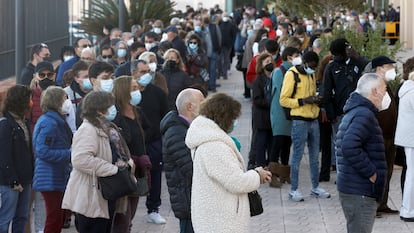Over half of the 36 omicron cases detected in Spain caused by community transmission
The 14-day incidence rate of the coronavirus has now risen to 381 infections per 100,000, while more than 6,000 Covid-19 patients are in hospital

The omicron variant of the coronavirus is starting to gain traction in Spain, where 19 out of the 36 detected cases are people who did not travel to high-risk countries and were not in contact with anyone who did. This means that the new strain is spreading through community transmission.
The other 17 cases were detected among “travelers from South Africa or their close contacts,” according to a situation update released on Monday afternoon by the Health Ministry. “Additionally, other countries have confirmed two cases in passengers from Spain,” reads the report.
Overall coronavirus infections are up again in Spain, where the 14-day incidence grew 58 points over the weekend to reach 381 cases per 100,000 people, according to the latest data released by the Health Ministry. This puts Spain in a high-risk scenario under the revised traffic-light system drawn up by the Spanish government.
Health officials reported 49,802 new diagnosed cases and added 103 fatalities to the official death count, which now stands at 88,484 There are 6,347 patients in hospital, a rise of 778 from Friday.
More infectious, less severe?
Across Europe, the data suggests that the omicron variant is spreading faster than real-time detection systems can deal with, since all cases must be confirmed through genetic sequencing, which is a days-long process.
The coming weeks will likely see “a substantial increase in omicron detection, which is already underway, until the new variant displaces the delta strain, something that could happen in around three weeks,” according to Federico García, head of microbiology at San Cecilio Hospital in Granada.
Jordi Vila, head of microbiology at Clínic Hospital in Barcelona, said that the “most likely” scenario for Spain is for the omicron strain to gradually become dominant. For now, however, he said that his hospital has not detected a substantial increase in omicron cases in lab tests.
This would suggest that the omicron variant is more infectious than other strains, as suspected by many experts. But the question of whether it causes more severe cases of Covid-19 is still a matter for debate, although preliminary data are cause for cautious optimism. But experts also note that even if it turns out to be less severe, a more infectious strain could still drive up the number of people requiring medical assistance, straining health services once again.
Another key question is whether existing Covid-19 vaccines will be effective against this latest variant. So far, preliminary data are showing a significant drop in protection against infections (which are nearly always mild or asymptomatic), although no conclusive analysis exists showing a reduction in protection against severe disease and death.
Third vaccine dose
It is very likely that, sooner or later, anyone wishing to get a booster shot will be able to do so. In Spain, the campaign to administer a third dose began in September and first targeted immunocompromised patients and residents of care homes. Later came the over-80 population, then the over-60s and healthcare workers. There is still no scientific evidence that a booster shot is urgent for people under 60 without any relevant health problems, although the group of experts advising the Spanish government is considering expanding the third dose to other age groups.
There are over five million doses still in storage, but the pace of inoculation has dropped after reaching a ceiling two weeks ago. There are also significant differences by region: nine out of 10 older citizens have received booster shots in Galicia, Navarre and Asturias, while the percentage is under 70% in Madrid, Catalonia and the Canary Islands.
Tu suscripción se está usando en otro dispositivo
¿Quieres añadir otro usuario a tu suscripción?
Si continúas leyendo en este dispositivo, no se podrá leer en el otro.
FlechaTu suscripción se está usando en otro dispositivo y solo puedes acceder a EL PAÍS desde un dispositivo a la vez.
Si quieres compartir tu cuenta, cambia tu suscripción a la modalidad Premium, así podrás añadir otro usuario. Cada uno accederá con su propia cuenta de email, lo que os permitirá personalizar vuestra experiencia en EL PAÍS.
¿Tienes una suscripción de empresa? Accede aquí para contratar más cuentas.
En el caso de no saber quién está usando tu cuenta, te recomendamos cambiar tu contraseña aquí.
Si decides continuar compartiendo tu cuenta, este mensaje se mostrará en tu dispositivo y en el de la otra persona que está usando tu cuenta de forma indefinida, afectando a tu experiencia de lectura. Puedes consultar aquí los términos y condiciones de la suscripción digital.








































